niversity College London (UCL) is a public research university in London, England, and a constituent college of the federalUniversity of London. It is the third largest university in the United Kingdom by total enrollment[5] (and largest by postgraduate enrollment)[7] and is consistently placed highly in global university rankings.[8][9][10][11][12]
Established in 1826 as London University by founders inspired by the radical ideas of Jeremy Bentham, UCL was the first university institution to be established in London, and the first in England to be entirely secular and to admit students regardless of their religion.[13] UCL also makes the contested claims of being the third-oldest university in England[note 1] and the first to admit women.[note 2] In 1836 UCL became one of the two founding colleges of the University of London, which was granted a royal charter in the same year. It has grown through mergers, including with the Institute of Neurology (in 1997), the Royal Free Hospital Medical School (in 1998), the Eastman Dental Institute (in 1999), the School of Slavonic and East European Studies (in 1999), the School of Pharmacy (in 2012) and the Institute of Education (in 2014).
UCL has its main campus in the Bloomsbury area of central London, with a number of institutes and teaching hospitals elsewhere in central London and a satellite campus in Doha, Qatar. UCL is organised into 11 constituent faculties, within which there are over 100 departments, institutes and research centres. UCL operates several culturally significant museums and manages collections in a wide range of fields, including the Petrie Museum of Egyptian Archaeology and the Grant Museum of Zoology and Comparative Anatomy, and administers the annual Orwell Prize in political writing. In 2016/17, UCL had around 39,400 students and 14,600 staff (including around 7,100 academic staff and 840 professors) and had a total group income of £1.327 billion, of which £459.8 million was from research grants and contracts.[2]
UCL alumni include the "Father of the Nation" of each of India, Kenya and Mauritius, the founders of Ghana, modern Japan and Nigeria, the inventor of the telephone, and one of the co-discoverers of the structure of DNA. UCL academics discovered five of the naturally occurring noble gases, co-discovered hormones, invented the vacuum tube, and made several foundational advances in modern statistics. There are at least 29 Nobel Prize winners and 3 Fields medalists amongst UCL's alumni and current and former staff.[note 3] UCL is a member of numerous academic organisations, including the Russell Group, and is part of UCL Partners, the world's largest academic health science centre,[14] and the "golden triangle" of research-intensive English universities.[15]
Contents
[hide]History[edit]
1826 to 1836 – London University[edit]
UCL was founded on 11 February 1826 under the name London University, as an alternative to the Anglican universities of Oxford and Cambridge.[16][17][18] London University's first Warden was Leonard Horner, who was the first scientist to head a British university.[19]
Despite the commonly held belief that the philosopher Jeremy Bentham was the founder of UCL, his direct involvement was limited to the purchase of share No. 633, at a cost of £100 paid in nine instalments between December 1826 and January 1830. In 1828 he did nominate a friend to sit on the council, and in 1827 attempted to have his disciple John Bowring appointed as the first professor of English or History, but on both occasions his candidates were unsuccessful.[20] This suggests that while his ideas may have been influential, he himself was less so. However, Bentham is today commonly regarded as the "spiritual father" of UCL, as his radical ideas on education and society were the inspiration to the institution's founders, particularly the Scotsmen James Mill (1773–1836) and Henry Brougham (1778–1868).[21]
In 1827, the Chair of Political Economy at London University was created, with John Ramsay McCulloch as the first incumbent, establishing one of the first departments of economics in England.[22] In 1828 the university became the first in England to offer English as a subject[23] and the teaching of Classics and medicine began. In 1830, London University founded the London University School, which would later become University College School. In 1833, the university appointed Alexander Maconochie, Secretary to the Royal Geographical Society, as the first professor of geography in the UK. In 1834, University College Hospital (originally North London Hospital) opened as a teaching hospital for the university's medical school.[24]
1836 to 1900 – University College, London[edit]
In 1836, London University was incorporated by royal charter under the name University College, London. On the same day, the University of London was created by royal charter as a degree-awarding examining board for students from affiliated schools and colleges, with University College and King's College, London being named in the charter as the first two affiliates.[25]
The Slade School of Fine Art was founded as part of University College in 1871, following a bequest from Felix Slade.[26]
In 1878, the University of London gained a supplemental charter making it the first British university to be allowed to award degrees to women. The same year, UCL admitted women to the faculties of Arts and Law and of Science, although women remained barred from the faculties of Engineering and of Medicine (with the exception of courses on public health and hygiene).[27][28] While UCL claims to have been the first university in England to admit women on equal terms to men, from 1878, the University of Bristol also makes this claim, having admitted women from its foundation (as a college) in 1876.[29] Armstrong College, a predecessor institution of Newcastle University, also allowed women to enter from its foundation in 1871, although none actually enrolled until 1881.[30] Women were finally admitted to medical studies during the First World War in 1917, although after the war ended limitations were placed on their numbers.[31]
In 1898, Sir William Ramsay discovered the elements krypton, neon and xenon whilst professor of chemistry at UCL.[32][33]
1900 to 1976 – University of London, University College[edit]
In 1900, the University of London was reconstituted as a federal university with new statutes drawn up under the University of London Act 1898. UCL, along with a number of other colleges in London, became a school of the University of London. While most of the constituent institutions retained their autonomy, UCL was merged into the University in 1907 under the University College London (Transfer) Act 1905 and lost its legal independence.[34]
1900 also saw the decision to appoint a salaried head of the college. The first incumbent was Carey Foster, who served as Principal (as the post was originally titled) from 1900 to 1904. He was succeeded by Gregory Foster (no relation), and in 1906 the title was changed to Provost to avoid confusion with the Principal of the University of London. Gregory Foster remained in post until 1929.[35][36][37] In 1906, the Cruciform Building was opened as the new home for University College Hospital.[38]
UCL sustained considerable bomb damage during the Second World War, including to the Great Hall and the Carey Foster Physics Laboratory. The first UCL student magazine, Pi Magazine, was published for the first time on 21 February 1946. The Institute of Jewish Studies relocated to UCL in 1959.
The Mullard Space Science Laboratory was established in 1967.[39] In 1973, UCL became the first international link to the precursor of the internet, the ARPANET.[40][41]
Although UCL was among the first universities to admit women on the same terms as men, in 1878, the college's senior common room, the Housman Room, remained men-only until 1969. After two unsuccessful attempts, a motion was passed that ended segregation by sex at UCL. This was achieved by Brian Woledge (Fielden Professor of French at UCL from 1939 to 1971) and David Colquhoun, at that time a young lecturer in pharmacology.[42]
1976 to 2005[edit]
In 1976, a new charter restored UCL's legal independence, although still without the power to award its own degrees.[43][44] Under this charter the college became formally known as University College London, having previously formally been "University of London, University College" since its incorporation into the University. This name abandoned the comma used in its earlier name of "University College, London".
In 1986, UCL merged with the Institute of Archaeology.[45] In 1988, UCL merged with the Institute of Laryngology & Otology, the Institute of Orthopaedics, the Institute of Urology & Nephrology and Middlesex Hospital Medical School.[45]
In 1993, a reorganisation of the University of London meant that UCL and other colleges gained direct access to government funding and the right to confer University of London degrees themselves. This led to UCL being regarded as a de facto university in its own right.[46]
In 1994, the University College London Hospitals NHS Trust was established.[47] UCL merged with the College of Speech Sciences and the Institute of Ophthalmology in 1995, the Institute of Child Health and the School of Podiatry in 1996[48] and the Institute of Neurology in 1997.[45][49] In 1998, UCL merged with the Royal Free Hospital Medical School to create the Royal Free and University College Medical School (renamed the UCL Medical School in October 2008). In 1999, UCL merged with the School of Slavonic and East European Studies[50][51] and the Eastman Dental Institute.[45]
The UCL Jill Dando Institute of Crime Science, the first university department in the world devoted specifically to reducing crime, was founded in 2001.[52]
Proposals for a merger between UCL and Imperial College London were announced in 2002.[53] The proposal provoked strong opposition from UCL teaching staff and students and the AUT union, which criticised "the indecent haste and lack of consultation", leading to its abandonment by the UCL Provost Sir Derek Roberts.[54] The blogs that helped to stop the merger are preserved, though some of the links are now broken: see David Colquhoun's blog[55] and the Save UCL blog,[56] which was run by David Conway, a postgraduate student in the department of Hebrew and Jewish studies.
The London Centre for Nanotechnology was established in 2003 as a joint venture between UCL and Imperial College London.[57][58]
Since 2003, when UCL Professor David Latchman became Master of the neighbouring Birkbeck, he has forged closer relations between these two University of London colleges, and personally maintains departments at both. Joint research centres include the UCL/Birkbeck Institute for Earth and Planetary Sciences, the UCL/Birkbeck/IoE Centre for Educational Neuroscience, the UCL/Birkbeck Institute of Structural and Molecular Biology, and the Birkbeck-UCL Centre for Neuroimaging.
2005 to 2010[edit]
In 2005, UCL was finally granted its own taught and research degree awarding powers and all UCL students registered from 2007/08 qualified with UCL degrees. Also in 2005, UCL adopted a new corporate branding under which the name University College London was replaced by the initialism UCL in all external communications.[59] In the same year, a major new £422 million building was opened for University College Hospital on Euston Road,[60] the UCL Ear Institute was established and a new building for the UCL School of Slavonic and East European Studies was opened.
In 2007, the UCL Cancer Institute was opened in the newly constructed Paul O'Gorman Building. In August 2008, UCL formed UCL Partners, an academic health science centre, with Great Ormond Street Hospital for Children NHS Trust, Moorfields Eye Hospital NHS Foundation Trust, Royal Free London NHS Foundation Trust and University College London Hospitals NHS Foundation Trust.[61] In 2008, UCL established the UCL School of Energy & Resources in Adelaide, Australia, the first campus of a British university in the country.[62]The School is based in the historic Torrens Building in Victoria Square and its creation followed negotiations between UCL Vice Provost Michael Worton and South Australian Premier Mike Rann.[63]
In 2009, the Yale UCL Collaborative was established between UCL, UCL Partners, Yale University, Yale School of Medicine and Yale – New Haven Hospital.[64] It is the largest collaboration in the history of either university, and its scope has subsequently been extended to the humanities and social sciences.[65][66]
2010 to 2015[edit]
In June 2011, the mining company BHP Billiton agreed to donate AU$10 million to UCL to fund the establishment of two energy institutes – the Energy Policy Institute, based in Adelaide, and the Institute for Sustainable Resources, based in London.[67]
In November 2011, UCL announced plans for a £500 million investment in its main Bloomsbury campus over 10 years, as well as the establishment of a new 23-acre campus next to the Olympic Park in Stratford in the East End of London.[68] It revised its plans of expansion in East London and in December 2014 announced to build a campus (UCL East) covering 11 acres and provide up to 125,000m2 of space on Queen Elizabeth Olympic Park.[69] UCL East will be part of plans to transform the Olympic Park into a cultural and innovation hub ("Olympicopolis") where UCL will open its first school of design, a centre of experimental engineering and a museum of the future, along with a living space for students.[70]
The School of Pharmacy, University of London merged with UCL on 1 January 2012, becoming the UCL School of Pharmacy within the Faculty of Life Sciences.[71][72] In May 2012, UCL, Imperial College London and the semiconductor company Intel announced the establishment of the Intel Collaborative Research Institute for Sustainable Connected Cities, a London-based institute for research into the future of cities.[73][74]
In August 2012, UCL received criticism for advertising an unpaid research position; it subsequently withdrew the advert.[75]
UCL and the Institute of Education formed a strategic alliance in October 2012, including co-operation in teaching, research and the development of the London schools system.[76] In February 2014, the two institutions announced their intention to merge,[77][78] and the merger was completed in December 2014.[79][80]
In September 2013, a new Department of Science, Technology, Engineering and Public Policy (STEaPP) was established within the Faculty of Engineering, one of several initiatives within the university to increase and reflect upon the links between research and public sector decision-making.[81]
In October 2013, it was announced that the Translation Studies Unit of Imperial College London would move to UCL, becoming part of the UCL School of European Languages, Culture and Society.[82] In December 2013, it was announced that UCL and the academic publishing company Elsevier would collaborate to establish the UCL Big Data Institute.[83] In January 2015, it was announced that UCL had been selected by the UK government as one of the five founding members of the Alan Turing Institute (together with the universities of Cambridge, Edinburgh, Oxford and Warwick), an institute to be established at the British Library to promote the development and use of advanced mathematics, computer science, algorithms and big data.[84][85]
2015 to present[edit]
In August 2015, the Department of Management Science and Innovation was renamed as the School of Management and plans were announced to greatly expand UCL's activities in the area of business-related teaching and research.[86][87] The School is currently being moved from the Bloomsbury campus to One Canada Square in Canary Wharf.
UCL established the Institute of Advanced Studies (IAS) in 2015 to promote interdisciplinary research in humanities and social sciences. The prestigious annual Orwell Prize for political writing moved to the IAS in 2016.
In June 2016 it was reported in the Times Higher Education that as a result of administrative errors hundreds of students who studied at the UCL Eastman Dental Institute between 2005–6 and 2013–14 had been given the wrong marks, leading to an unknown number of students being attributed with the wrong qualifications and, in some cases, being failed when they should have passed their degrees.[88] A report by UCL’s Academic Committee Review Panel noted that, according to the Institute’s own review findings, senior members of UCL staff had been aware of issues affecting students' results but had not taken action to address them.[89] The Review Panel concluded that there had been an apparent lack of ownership of these matters amongst the Institute’s senior staff.[89]
In December 2016 it was announced that UCL would be the hub institution for a new £250 million national dementia research institute, to be funded with £150 million from the Medical Research Council and £50 million each from Alzheimer's Research UK and the Alzheimer's Society.[90][91]
In May 2017 it was reported that staff morale was at "an all time low", with 68% of members of the academic board who responded to a survey disagreeing with the statement "UCL is well managed" and 86% with "the teaching facilities are adequate for the number of students". Michael Arthur, the Provost and President, linked the results to the "major change programme" at UCL. He admitted that facilities were under pressure following growth over the past decade, but said that the issues were being addressed through the development of UCL East and rental of other additional space.[92]
Campus and locations[edit]
Bloomsbury[edit]
UCL is primarily based in the Bloomsbury area of the London Borough of Camden, in Central London. The main campus is located around Gower Street and includes the biology, chemistry, economics, engineering, geography, history, languages, mathematics, management, philosophy and physics departments, the preclinical facilities of the UCL Medical School, the London Centre for Nanotechnology, the Slade School of Fine Art, the UCL Union, the main UCL Library, the UCL Science Library, the Bloomsbury Theatre, the Petrie Museum of Egyptian Archaeology, the Grant Museum of Zoology and the affiliated University College Hospital. Close by in Bloomsbury are the UCL Cancer Institute, the UCL Faculty of the Built Environment (The Bartlett), the UCL Faculty of Laws, the UCL Institute of Archaeology, the UCL Institute of Education, the UCL School of Pharmacy, the UCL School of Public Policy and the UCL School of Slavonic and East European Studies.[93]
The area around Queen Square in Bloomsbury, close by to the main campus, is a hub for brain-related research and healthcare, with the UCL Institute of Cognitive Neuroscience and UCL Institute of Neurology located in the area along with the affiliated National Hospital for Neurology and Neurosurgery. The UCL Great Ormond Street Institute of Child Health and the affiliated Great Ormond Street Hospital for Children are located adjacently, forming a hub for paediatric research and healthcare. The UCL Ear Institute, the UCL Eastman Dental Institute and the affiliated Royal National Throat, Nose and Ear Hospital and Eastman Dental Hospital are located nearby in east Bloomsbury along Gray's Inn Road and form a hub for research and healthcare in audiology and dentistry respectively.
Notable UCL buildings in Bloomsbury include the UCL Main Building, including the Octagon, Quad, Cloisters and the Wilkins building designed by William Wilkins; the Cruciform Building, Gower Street (a red, cross-shaped building previously home to University College Hospital); and the Rockefeller Building, University Street, home to the original University College Hospital Medical School and named after the American oil magnate John D. Rockefeller after support from the Rockefeller Foundation in the 1920s. Due to its position within London and the historical nature of its buildings, including most notably the UCL Main Building and Quad, UCL has been used as a location for a number of film and television productions, including Doctor in the House (1954), Gladiator (2000), The Mummy Returns (2001), The Dark Knight (2008) and Inception (2010).[94]
A number of important institutions are based near to the main campus, including the British Library, the British Medical Association, the British Museum, Cancer Research UK, Gray's Inn, the Medical Research Council, RADA, the Royal Academy of Art, the Royal Institution and the Wellcome Trust. Many University of London schools and institutes are also close by, including Birkbeck, University of London, London Business School, the London School of Hygiene & Tropical Medicine, the Royal Veterinary College, the School of Advanced Study, the School of Oriental and African Studies and the Senate House Library. The nearest London Underground station is Euston Square, with Goodge Street, Russell Square and Warren Street all nearby. The mainline railway stations at Euston, King's Cross and St Pancras are all within walking distance.
UCL East[edit]
In 2014 it was announced that UCL would be building an additional campus at the Queen Elizabeth Olympic Park, referred to as UCL East, as part of the development of the so-called Olympicopolis site at the southern edge of the park. UCL master planners were appointed in spring 2015, and the first University building is estimated to be completed in time for academic year 2019/20.[95]
It was revealed in June 2016 that the UCL East expansion could see the university grow to 60,000 students. The proposed rate of growth was reported to be causing concern, with calls for it to be slowed down to ensure the university could meet financial stability targets.[96]
Other sites[edit]
Elsewhere in Central London are the UCL Institute of Ophthalmology (based in Clerkenwell), the Windeyer Institute (based in Fitzrovia), the UCL Institute of Orthopedics and Musculoskeletal Science (based in Stanmore), The Royal Free Hospital and the Whittington Hospital campuses of the UCL Medical School, and a number of other teaching hospitals. The UCL School of Management is located at Level 38, One Canada Square in Canary Wharf, London. The Department of Space and Climate Physics (Mullard Space Science Laboratory) is based in Holmbury St Mary, Surrey, the UCL School of Energy and Resources is based in Adelaide, Australia and there is a UCL campus in Doha, Qatar specialised in archaeology, conservation and museum studies.[97] Since September 2010 UCL has been running a University Preparatory Certificate course at Nazarbayev University in Astana, Kazakhstan.[98]
Organisation and administration[edit]
Governance[edit]
Although UCL is a constituent college of the federal University of London, in most ways it is comparable with free-standing, self-governing and independently funded universities, and it awards its own degrees.[99]
UCL's governing body is the Council, which oversees the management and administration of UCL and the conduct of its affairs, subject to the advice of the Academic Board on matters of academic policy, and approves UCL's long-term plans.[100] It delegates authority to the Provost, as chief executive, for the academic, corporate, financial, estate and human resources management of UCL. The Council normally meets six times each year. The Council comprises 20 members, of whom 11 are members external to UCL; seven are UCL academic staff, including the Provost, three UCL professors and three non-professorial staff; and two are UCL students. The Chair is appointed by Council for a term not normally exceeding five years. The Chair is ex officio Chair of the Honorary Degrees and Fellowships Committee, Nominations Committee and Remuneration and Strategy Committee.[100] The current Chair of the Council is Dame DeAnne Julius.
UCL's principal academic and administrative officer is the President and Provost, who is also UCL's designated principal officer for the purposes of the Financial Memorandum with the Higher Education Funding Council for England (HEFCE).[100] The Provost is appointed by Council after consultation with the Academic Board, is responsible to the Council, and works closely with its members, and especially with the Chair of Council. The current and tenth Provost and President of UCL is Michael Arthur, who replaced Sir Malcolm Grant in 2013.[101]
Vice-Provosts are appointed by the Provost, through the Council, to assist and advise the Provost as required. The Vice-Provosts are members of the Provost's Senior Management Team. There are presently six Vice-Provosts (for Education, Enterprise, Health, International, Research, and Operations).[100]
The Deans of UCL's faculties are appointed by Council and, together with the Vice-Provosts and the Director of Finance and Business Affairs, form the members of the Provost's Senior Management Team. The Deans' principal duties include advising the Provost and Vice-Provosts on academic strategy, staffing matters and resources for academic departments within their faculty; overseeing curricula and programme management at faculty level; liaising with Faculty Tutors on undergraduate admissions and student academic matters; overseeing examination matters at faculty level; and co-ordinating faculty views on matters relating to education and information support.[100]
List of Provosts[edit]
- Sir Gregory Foster (1906–1929)[37]
- Sir Allen Mawer (1930–1942)[37]
- David Pye (1943–1951)[37]
- Sir Ifor Evans (1951–1966)[37]
- Lord Annan (1966–1978)[37]
- Sir James Lighthill (1979–1989)[37]
- Sir Derek Roberts (1989–1999;[37] 2002–2003)
- Sir Christopher Llewellyn Smith (1999–2002)[37]
- Sir Malcolm Grant (2003–2013)[37]
- Michael Arthur (2013–present)
Faculties and departments[edit]
UCL's research and teaching is organised within a network of faculties and academic departments. Faculties and academic departments are formally established by the UCL Council, the governing body of UCL, on the advice of the Academic Board, which is UCL's senior academic authority. UCL is a comprehensive university with teaching and research across the full range of the arts, humanities, social sciences, physical, biological and medical sciences, engineering and the built environment, although it does not currently have a veterinary, music, drama or nursing school.[102] UCL is currently organised into the following 11 constituent faculties:[103]
| Faculty[104] | Academic and research staff (as at 30 April 2012)[104] | Undergraduate students (2011/12)[104] | Postgraduate students (2011/12)[104] |
| UCL Faculty of Arts and Humanities | 328 | 2,157 | 1,075 |
| UCL Faculty of Brain Sciences | 1,249 | 722 | 1,457 |
| UCL Faculty of the Built Environment (The Bartlett) | 355 | 570 | 1,241 |
| UCL Faculty of Engineering Sciences | 667 | 2,049 | 1,642 |
| UCL Faculty of Laws | 137 | 528 | 458 |
| UCL Faculty of Life Sciences | 798 | 1,183 | 486 |
| UCL Faculty of Mathematical and Physical Sciences | 754 | 2,187 | 677 |
| UCL Faculty of Medical Sciences | 1,257 | 1,773 | 1,342 |
| UCL Faculty of Population Health Sciences | 1,092 | 64 | 815 |
| UCL Faculty of Social and Historical Sciences | 621 | 2,539 | 1,894 |
| UCL Institute of Education | n/a | n/a | n/a |
| Total | 5,277 (ex. Institute of Education) | 13,772 (ex. Institute of Education) | 11,087 (ex. Institute of Education) |
To facilitate greater interdisciplinary interaction in research and teaching UCL also has three strategic faculty groupings:
- the UCL School of Life and Medical Sciences (comprising the Faculties of Brain Sciences, Life Sciences, Medical Sciences and Population Health Sciences);
- the UCL School of the Built Environment, Engineering and Mathematical and Physical Sciences (comprising the UCL Faculty of the Built Environment, UCL Faculty of Engineering Sciences and UCL Faculty of Mathematical & Physical Sciences); and
- the UCL Faculty of Arts & Humanities, UCL Faculty of Laws, UCL Faculty of Social & Historical Sciences and the UCL School of Slavonic & East European Studies.
Finances[edit]
In the financial year ended 31 July 2016, UCL had a total income (excluding share of joint ventures) of £1.36 billion (2014/15 – £1.26 billion) and a total expenditure of £1.23 billion (2014/15 – £1.22 billion).[2] Key sources of income included £530.4 million from research grants and contracts (2014/15 – £427.3 million), £421.1 million from tuition fees and education contracts (2014/15 – £364.2 million), £192.1 million from funding body grants (2014/15 – £195.2 million) and £25.1 million from donations and endowments (2014/15 – £20.3 million).[2] During the 2015/16 financial year UCL had a capital expenditure of £146.6 million (2014/15 – £149.3 million).[2] At year end UCL had endowments of £100.9 million (31 July 2015 – £104.1 million) and total net assets of £1.19 billion (31 July 2015 – £1.07 million).[2][note 4]
In 2014/15, UCL had the third-highest total income of any British university (after the University of Cambridge and the University of Oxford), and the third-highest income from research grants and contracts (after the University of Oxford and Imperial College London).[105] For the 2015/16 academic year, UCL was allocated a total of £171.37 million for teaching and research from the Higher Education Funding Council for England (HEFCE), the highest amount allocated to any English university, of which £39.76 million is for teaching and £131.61 million is for research.[106] According to a survey published by the Sutton Trust, UCL had the eighth-largest endowment of any British university in 2012.[107]
UCL launched a 10-year, £300 million fundraising appeal in October 2004, at the time the largest appeal target set by a university in the United Kingdom.[108] UCL launched a new £600 million fundraising campaign in September 2016 titled "It's All Academic – The Campaign for UCL".[109][110]
In April 2016, UCL signed a £280 million 30-year loan with the European Investment Bank, the largest loan ever borrowed by a UK university and largest ever loan by the EIB to a university.[111][112] The monies are to be used to fund a £1.25 billion capital expenditure programme in Bloomsbury and Stratford.[111][112] Some UCL academics oppose the expansion plans.[113]
Terms[edit]
The UCL academic year is divided into three terms.[114] For most departments except the Medical School, Term One runs from late September to mid December, Term Two from mid January to late March, and Term Three from late April to mid June.[114] Certain departments operate reading weeks in early November and mid February.[114]
Logo, arms and colours[edit]
Whereas most universities primarily use their logo on mundane documents but their coat of arms on official documents such as degree certificates, UCL exclusively uses its logo. The present logo was adopted as part of a rebranding exercise in August 2005.[59] Prior to that date, a different logo was used, in which the letters UCL were incorporated into a stylised representation of the Wilkins Building portico.
UCL formerly made some use of a pseudo-heraldic "coat of arms" depicting a raised bent arm dressed in armour holding a green upturned open wreath.[115] A version of this badge (not on a shield) appears to have been used by UCL Union from shortly after its foundation in 1893.[116] However, the arms have never been the subject of an official grant of arms, and depart from several of the rules and conventions of heraldry. They are no longer formally used by the college, although they are still occasionally seen in unofficial contexts, or used in modified form by sports teams and societies. The blazon of the arms might be rendered as: Purpure, on a wreath of the colours Argent and Blue Celeste, an arm in armour embowed Argent holding an upturned wreath of laurel Vert, beneath which two branches of laurel Or crossed at the nombril and bound with a bowed cord Or, beneath the nombril a motto of Blue Celeste upon which Cuncti adsint meritaeque expectent praemia palmae. The motto is a quotation from Virgil's Aeneid, and translates into English as "Let all come who by merit deserve the most reward".[117]
UCL's traditional sporting and academic colours of purple and light blue are derived from the arms.
Secularism[edit]
From its foundation the college was deliberately secular; the initial justification for this was that it would enable students of different Christian traditions (specifically Roman Catholics, Anglicans and Protestants) to study alongside each other without conflict. UCL has retained this strict secular position and, unlike most other UK universities, has no specific religious prayer rooms. There has, however, been a Christian chaplaincy since 2005 and there is no restriction on religious groups among students. A "quiet contemplation room" also allows prayer for staff and students of all faiths.
Memberships, affiliations and partnerships[edit]
UCL is a constituent college of the federal University of London, of which it was one of the two founding members in 1836 (the other being King's College London).[118]
UCL is a founding member of the Russell Group, an association of 24 British research universities established in 1994,[119] and of the G5 lobbying group, which it established in early 2004 with the universities of Cambridge and Oxford, Imperial College London and the London School of Economics.[120][121] UCL is regarded as forming part of the "golden triangle", an unofficial term for a set of leading universities located in the southern English cities of Cambridge, London and Oxford[122] including the universities of Cambridge and Oxford, Imperial College London, King's College London and the London School of Economics.[123]
UCL has been a member of the League of European Research Universities since January 2006, and is currently one of five British members (the others being the universities of Cambridge, Edinburgh and Oxford and Imperial College London).[124][125] Other international groupings that UCL is a member of include the Association of Commonwealth Universities, the European University Association and the Universities Research Association.[126] UCL has a major collaboration with Yale University, the Yale UCL Collaborative, and has hundreds of other research and teaching partnerships, including around 150 research links and 130 student-exchange partnerships with European universities.[13]
UCL has been a member of the SES engineering and physical sciences research alliance since May 2013, which it formed with the universities of Cambridge, Oxford and Southampton and Imperial College London (King's College London subsequently joined in 2016).[127] UCL is a member of the Thomas Young Centre, an alliance of London research groups working on the theory and simulation of materials; the other members are Imperial College London, King's College London and Queen Mary University of London.[128] UCL is one of the five founding members of the Alan Turing Institute, the UK's national institute for data sciences (together with the universities of Cambridge, Edinburgh, Oxford and Warwick).[129] It also operates the London Centre for Nanotechnology, a multidisciplinary research centre in physical and biomedical nanotechnology, in partnership with Imperial College London.[130]
UCL has a close partnership with University College London Hospitals NHS Foundation Trust; the Trust's hospitals are teaching sites for the UCL Medical School, UCL and the Trust are joint partners in the UCLH/UCL Biomedical Research Centre and the Institute of Sport, Exercise and Health,[131] and both are members of the UCL Partners academic health science centre.[14][132][133] UCL is a founding member of the Francis Crick Institute, a major biomedical research centre in London which is a partnership between Cancer Research UK, Imperial College London, King's College London, the Medical Research Council, the Wellcome Trust and UCL.[134] UCL also operates the Bloomsbury Research Institute, a research institute focused on basic to clinical and population studies in bacteriology, parasitology and virology, in partnership with the London School of Hygiene & Tropical Medicine.[135]
UCL offers joint degrees with numerous other universities and institutions, including The Anna Freud National Centre for Children and Families,[136] Columbia University,[137] the University of Hong Kong,[138] Imperial College London,[139] New York University,[140] Peking University[141] and Yale University.[142]
UCL is the sponsor of the UCL Academy, a secondary school in the London Borough of Camden. The school opened in September 2012 and was the first in the UK to have a university as sole sponsor.[143] UCL also has a strategic partnership with Newham Collegiate Sixth Form Centre.[144]
UCL is a founding member of Knowledge Quarter, a partnership of academic, cultural, research, scientific and media organisations based in the knowledge cluster in the Bloomsbury and King's Cross area of London.[145] Other members of the partnership include the British Library, the British Museum, Google and the Wellcome Trust.[145]
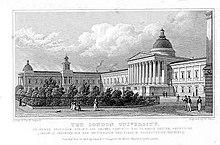
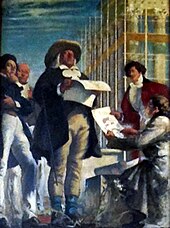

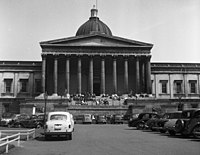
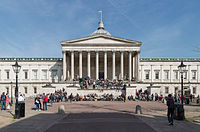



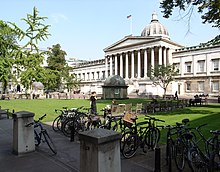




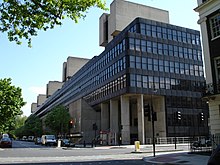




No comments:
Post a Comment